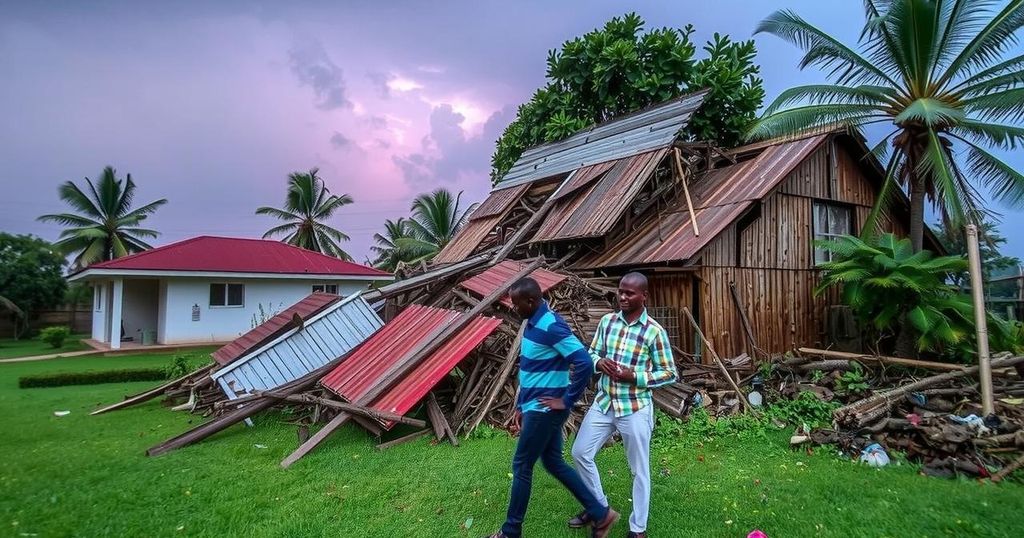Weather
World news
AFRICA, BLANTYRE, CHI, CHIDO, CHIP, CHIPILIRO KHAMULA, COMOROS, COMOROS ARCHIPELAGO, DEATH TOLL, DEPARTMENT OF DISASTER MANAGEMENT AFFAIRS, DISASTER MANAGEMENT, FLOODING, FLOODS, INDIAN OCEAN, KASUNGU, KHAMULA, LILONGWE, LUCY MTILATILA, MACHINGA, MADAGASCAR, MALAWI, MALAWI DEPARTMENT OF CLIMATE CHANGE AND METEOROLOGICAL SERVICES, MONSOON, MOZAMBIQUE, NACALA, NATURAL DISASTERS, SALIMA, U. N. OFFICE FOR THE COORDINATION OF HUMANITARIAN AFFAIRS
Ethan Kumar
0 Comments
Tropical Storm Chido Causes Fatalities and Displacement in Malawi
Tropical Storm Chido has killed at least seven people in Malawi and affected over 30,000 others. Significant damage occurred, including roof displacements in multiple districts. Relief efforts are underway, and school classes have resumed after a temporary suspension due to the storm’s threats. The storm also impacted Mozambique and the Comoros archipelago significantly.
Tropical Storm Chido has tragically claimed the lives of at least seven individuals and severely impacted over 30,000 people across Malawi, according to recent reports from disaster management officials. The storm resulted in significant destruction, including the dislodging of roofs from schools, health facilities, and private houses. An official statement from the Malawi Department of Disaster Management Affairs indicated that 7,721 households were affected, translating to approximately 34,741 individuals.
The fatalities were noted in various districts: three deaths occurred in Salima, while Kasungu, Machinga, Blantyre, and Lilongwe districts each recorded one death. Furthermore, 16 injuries have been documented in connection with the storm’s passage. Originating northeast of Madagascar, Chido made landfall on Sunday in Nacala, Mozambique, where it wrought havoc. The United Nations Office for the Coordination of Humanitarian Affairs highlighted the storm’s widespread impact, reporting over 174,000 affected individuals in Mozambique and 64,000 in the Comoros archipelago, in addition to the damage it caused in Malawi.
The remnants of Chido proceeded through Malawi on Monday, manifesting as a moderate tropical storm that caused heavy rain and flooding across approximately 17 districts. Lucy Mtilatila, the director of the Malawi Department of Climate Change and Meteorological Services, confirmed the storm had dissipated, noting, “Our eyes are on the Indian Ocean in case there will be another development. But so far, so good.” In light of the storm, the government had temporarily suspended school classes as a preventive measure, but classes have since resumed.
Khamula stated that all search and rescue teams have been withdrawn from risk-prone areas, allowing the agency, in partnership with various humanitarian organizations, to initiate relief operations aimed at supporting the affected households.
Natural disasters like Tropical Storm Chido have increasingly become a critical issue for countries situated in storm-prone regions. Historically, storms of this nature can cause substantial loss of life and property, necessitating efficient disaster management responses and humanitarian relief efforts. As storms develop in areas such as the Indian Ocean, their paths can lead to devastating impacts both locally and in neighboring regions, thus amplifying the need for coordinated disaster management strategies and community preparedness.
In summary, Tropical Storm Chido has had catastrophic effects on both Malawi and surrounding regions, with confirmed fatalities and wide-scale damage to infrastructure. The responses from the Malawi Department of Disaster Management Affairs signal an ongoing commitment to support recovery efforts in the faces of such humanitarian crises. Continuous monitoring and necessary precautions are essential as new weather developments could arise in the Indian Ocean.
Original Source: www.voanews.com




Post Comment